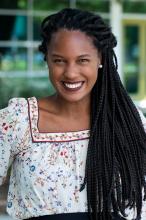
About Andréia Coutinho Louback
Andréia Coutinho Louback is passionate about social justice and has 10 years of experience in communication. She has a master's degree in Ethnic Racial Relations at the Federal Institute of Technology (CEFET/RJ) and a bachelor's degree in Journalism from Pontifical Catholic University (PUC-Rio). Currently, she works as a consulting and specialist on climate justice in different organizations of civil society in Brazil.
In 2018, she worked in the Institute for Climate and Society (iCS), one of the main Brazilian climate organizations, where she built an institutional communication from scratch, and developed a lot of products and initiatives. In 2019, she organized the first panel about climate justice in Brazil in the 25th Conference of the Parties of the United Nations on Climate Change (COP25), in Madrid. In 2020, Andréia worked on a climate justice project at Alana Institute, where she ran some campaign planning, and mobilized climate networks. In 2022, she also attended the COP26, in Glasgow, participating in several initiatives of environmental and climate justice discussions as a journalist.
Presently, Ms. Louback is one of the few specialists in race and climate change in Brazil. She is responsible for coordinating an unprecedented publication about climate justice in the Climate Observatory, that reach out narratives and stories about women and all vulnerable population affected directly by climate change. She keeps her position as a spokesperson at different initiatives about climate, gender, race, and intersectionality.
At her yearlong Humphrey Fellowship, UC Davis, she intends to investigate how Brazilian black movements have been affected by climate change and environmental justice, and how Brazil can develop climate justice policies focused on social justice and human rights inspired by the United States' experience.
Please contact Ms. Louback at aclouback@ucdavis.edu
Available for:
- Speaking about climate justice, gender, and environmental injustice in Brazil
- Teaching about climate communications at universities, workshops, and schools
- Visiting local communities affected disproportionally by climate change effects